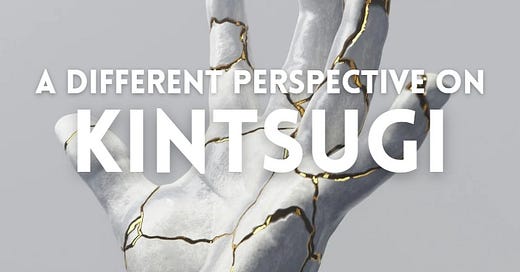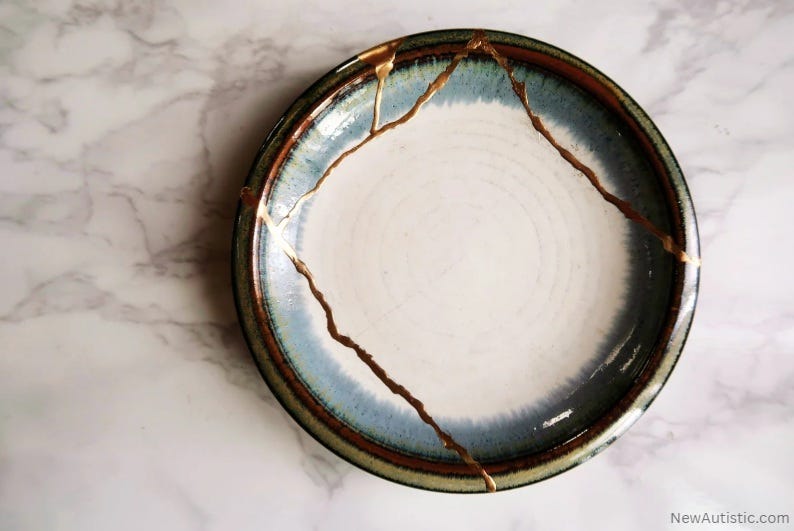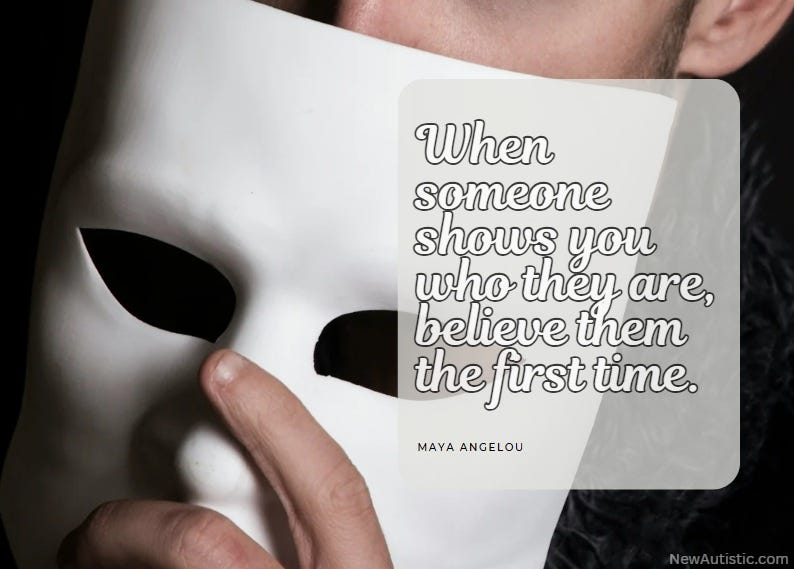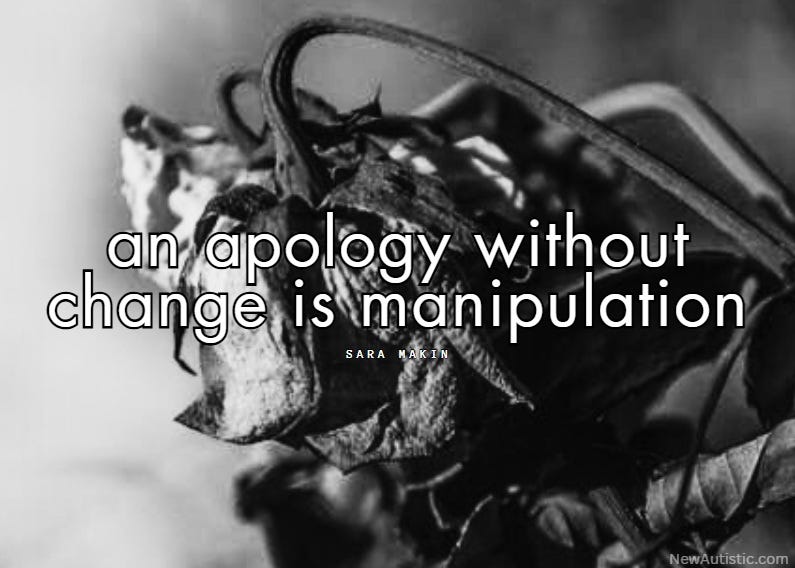A Different Perspective on Kintsugi
The Cycle of Breaks and Repairs: When is it Time to Give Up the Gold?
Assuming you’re reading this, you’re probably no stranger to the idea of kintsugi — the Japanese art of repairing broken ceramics with gold, making them more beautiful in the process — and how so many articles on mental health or self-help use it as an illustration to show that what was once broken can be mended.
Do not misunderstand me; the underlying message in such articles is helpful, especially for those who have struggled with trauma, loss, and/or hardship throughout their lives. There is something undeniably beautiful about kintsugi ceramics, and I agree that the gold and lacquer repairs often enhance the original piece.
Along a similar vein, those who have gone through significant struggles are often enhanced by them, growing into more understanding, empathetic, and resilient people. The parallels are unmistakable, and the metaphor of kintsugi brings many traumatized people solace and tranquility.
I am not here to discredit those people or ideas. Instead, I wish to offer another, perhaps unconsidered look, especially when it comes to those who are in ongoing difficult or toxic relationships.
Another Perspective: A Troubled Relationship
Imagine yourself in a relationship with someone you care deeply about — in this case, a close friend named Mary. You two grew up together, shared many wonderful memories and experiences, and have supported one another through many tough situations. You can’t imagine your life without her!
However, Mary starts becoming more and more unreliable as time goes on. While you’re always there to listen and support her, she never seems to have the time for you. In fact, she’s started flaking on meetups without communicating beforehand, leaving you sitting alone at restaurants and wasting time waiting on her.
An Attempt to Mend
Like any mature person, you reach out to Mary and ask if something is wrong, or if something has changed. Perhaps you’ve done or said something that upset her? At first, she claims that nothing is wrong and that nothing has changed, but after pressing her a bit more, she finally admits that she has had other, more pressing priorities in her life and has been neglecting you and taking your friendship for granted.
Saddened and hurt by this admission from Mary, you express to her your feelings, pouring your heart out and struggling to hold back tears. Ostensibly realizing the profound impact her actions have had on you, she immediately apologizes and promises to change her behavior to prove that you do indeed matter to her.
And, to her credit, she does! Mary again makes time for you, reaches out to you, offers support, and even plans a weekend getaway for the two of you where you have a wonderful time talking and reminiscing about the “good ol’ days” when you were younger. By the end of the weekend, your friendship is stronger than ever, despite the cracks that had formed by some months of neglect. You might even say the relationship was repaired with gold.
Relapse and Repeat
However, not so long after your fun-filled weekend, Mary again starts putting you on the back burner. You try to reach out to her when your beloved pet dies, but she doesn’t respond for some time. You soon become worried, thinking that something might’ve happened to her, but when you reach out and express your concern, she snaps back at you, texting you back quickly and tersely, telling you that you “aren’t always her top priority.”
As you look down at your phone, confused, you aren’t sure what to think. Why is she acting like this again? Not so long ago, you had your heart-to-heart talk, and she is once again being neglectful and dismissive. What is going on? You don’t respond, mostly because you aren’t sure how to.
More Empty Apologies
A day later, Mary reaches back out to you, profusely apologizing for her outburst, saying that she “knows it hurt you” and that she “didn’t mean it.” You see, she’s just been so overwhelmed with work and her new boyfriend that she forgot to check in on you, but she “really meant to.” She wants to “make it up to you” by treating you to a spa weekend! Because you miss your best friend’s connection and closeness, you agree, and by the end of the weekend, you’re thick as thieves again! All is well, and you feel closer than ever! The relationship is once more repaired with gold.
And again, things go well for a while… until they don’t. Once again, Mary stops responding and then proceeds to lash out at you when you reach out to repair the connection you once had — before, of course, profusely apologizing and swearing it won’t happen again.
Reflections
Do you believe Mary? How many times would you forgive her before finally cutting her off? I think most of us reading this would agree that after the second or third time, we’d probably move on from the relationship.
Pulling this anecdote back to the topic of this article, imagine you have a ceramic vase that’s been broken and repaired in the kintsugi fashion. Being broken once or twice is probably fixable, but what about more than that? Imagine someone keeps smashing your vase again and again and again. At what point is it irreparable?
And yet, so many of us reading this have been in similar situations with friends, family, and even romantic partners. We admit that Mary’s behavior is toxic, and yet we’re unwilling to admit when our loved one’s behavior is. We are willing to acknowledge that a broken vase can only be repaired a finite number of times, and yet we keep handing it back to the person who has smashed it.
Knowing When to Give Up the Gold
Perhaps what we need isn't another metaphor about being broken and beautifully repaired, but rather the wisdom and discernment to recognize when a relationship has been shattered beyond restoration. The value of kintsugi lies not just in the golden repairs, but also in the extreme care taken to preserve something truly worth saving.
There comes a point when continuing to repair what keeps breaking becomes not resilience, but self-harm. Thus, the most profound act of self-care might not be in gathering the gold to mend again, but in acknowledging that some breaks are final—and that's okay. In these moments, our growth comes not from making something beautiful from brokenness, but from having the courage to let go and create something new.
Thanks for Reading!
Thanks for taking time out of your busy day to spend some time with me! I encourage all of my readers to RISE (Reflect, Improve, Strengthen, & Evolve) with me because healing is a lifelong journey — it’s not always easy, but it’s always worth it. You are loved, cherished, and valued. Don’t ever let anyone ever convince you otherwise.
My commitment to bringing you FREE, well-researched, and comprehensive content means I spend considerable time and effort writing each article or post without compensation.
Want to Support Me?
The simplest FREE way you can support me is by subscribing, sharing, or leaving a comment:
I believe in keeping my content accessible to everyone, without paywalls, because I know the work I do matters. For that reason, I’m beyond grateful for any financial support! If you'd like to support me and my work, check out my art website at AriesArtwork.com to bring home something unique or find a gift for that special someone in your life:
I’ll see you again when I’ve got a new info-dump for you, my Newtistics Crew!
—Skylar Aries









